Islamic Republic To Attack Anyone Involved In Protests Anywhere
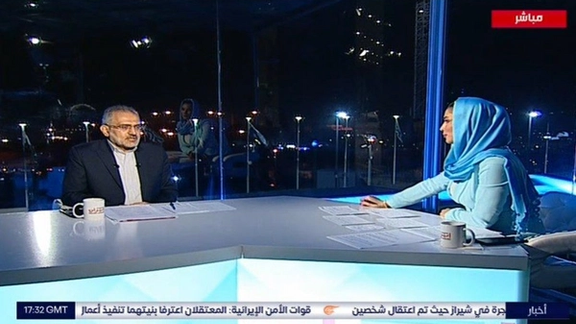
The Iranian vice president for parliamentary affairs has threatened that the Islamic Republic will respond to anyone involved in the current protests anywhere in the world.

The Iranian vice president for parliamentary affairs has threatened that the Islamic Republic will respond to anyone involved in the current protests anywhere in the world.
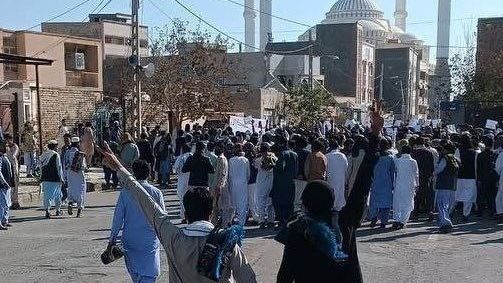
Security forces have again cracked down on protesters who took to the streets and chanted against the Supreme Leader and the IRGC in southeastern Iran on Friday.
Videos posted on social media show thousands marching in the streets of Sistan and Baluchistan province capital Zahedan and other predominantly Sunni Baluchi population centers of Khash, Iranshahr (Pahreh or Bahreh), Rask, the border town of Pishin, strategic port city of Chabahar, and Saravan.
The leader of the Baluch people Molavi Abdolhamid also in his Friday sermon harshly criticized Supreme Leader Ali Khamenei’s rule.
In videos posted on social media from Zahedan, Khash, Rask, Saravan,and Iranshahr gunshots are heard but no casualties have been reported yet, except in Iranshahr where several have reportedly been wounded.
Protesters in Zahedan and other cities took to the streets after Friday prayers chanting “Down with the Dictator,” “Death to Khamenei”, and “I’ll kill those who killed my brother,”. Videos also show people chanting slogans against the IRGC and its militia, the Basij as well as “From Zahedan to Tehran, I will give my life for Iran”.
Protesters also carried posters of Khodanour Lajoie, a young man shot to death on October 1. A photo of Lajoei chained to a lamppost by the police several months ago has turned into a symbol of government’s injustice in impoverished Sistan and Baluchestan.
In his sermon at Maki Mosque in Zahedan this week, popular Sunni religious leader Abdolhamid, officially known as Molavi Shaikh Abdolhamdid Esmailzehi, once again blasted the use of lethal force against protesters in Baluchestan and elsewhere in Iran.
“A government with which people are dissatisfied is no good and has to be toppled,” he said and demanded the release of all those arrested in the protests across the country. He also blasted those lawmakers who recently demanded the death sentence for some protesters. “In Khamenei’s rule there is no freedom. Which political party or group is free? We have neither freedom of speech, nor freedom of media,” he added in unprecedented criticism against the Supreme Leader.
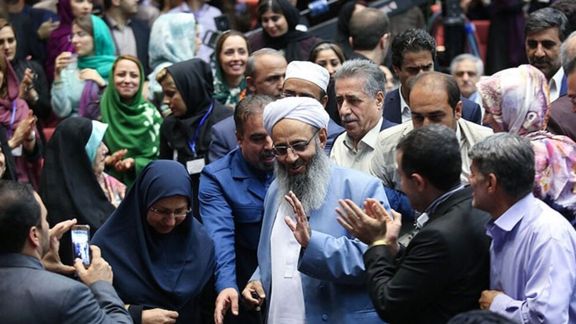
The Sunni cleric also demanded punishment for those responsible for killing Baluch protesters and refuted claims of separatism brought against them by the government. He alleged that security forces tried to bribe the families of the victims with money to remain silent, which they rejected. “They said they didn’t want money; they wanted their dignity to be preserved.”
Security forces used live ammunition to disperse protests in Khash on November 4, killing at least 18 protesters and bystanders, including two children. “This latest deadly incident in Sistan and Baluchistan province reveals that protesters from the oppressed Baluchi minority have borne the brunt of the security forces’ particularly vicious crackdown on demonstrations,” , Amnesty said in a report released November 10.
The report said evidence gathered by the organization “points to a pattern that has emerged in Sistan and Baluchistan province over the past five weeks” of the use of lethal force to against Baluchi protesters.
The global rights watchdog reiterated its call on the international community to take urgent action to stop further killings of protesters in the province and across Iran. “The UN Human Rights Council must help break this cycle of systemic impunity by establishing an independent investigative and accountability mechanism to investigate crimes under international law and other serious human rights violations committed in Iran,” Amnesty said.
Abdolhamid’s call for a referendum with the presence of international observers to decide the future form of government in Iran has hugely angered hardliners. He recently expressed more liberal views about the role of women in society after being criticized by some Baluch activists for not mentioning women and acknowledging gender equality in his fiery Friday prayer sermons.
Reports about the alleged rape of a 15-year-old Baluch girl in June by a police commander in Chabahar, who has remained immune to prosecution, sparked protests in Zahedan on September 30. At least 100 protesters were reportedly killed in the province since then.

Amid international concerns over the Islamic Republic’s violent crackdown on dissent, its foreign minister has warned the UN Human Rights Council over organizing any session to discuss the situation.
In a phone conversation with UN Secretary General Antonio Guterres Thursday night, Foreign Minister Hossein Amir-Abdollahian warned of the “negative consequences” of the UNHRC’s “political measure” on cooperation between the Islamic Republic and the West, referring to calls for a special meeting over the deadly clampdown on the current protests across Iran.
Alleging that the Islamic Republic has "deeply exercised restraint" in the ongoing unrest – which has left over 300 protesters dead and about 15,000 detained, he told the UN chief that such a meeting should be held for countries that "promote violence and terror."
“The UN Human Rights Council should hold sessions for governments that are encouraging violence and terror, not for the Islamic Republic of Iran which is a true defender of human rights and has exercised great restraint during recent riots,” he said.
Amir-Abdollahian added that “Contrary to the UN Charter, a few Western countries exploited the peaceful demands in Iran and encouraged violence and offered tutorials on building weapons and Molotov cocktails on media and social networks which led to the killing of police and insecurity in Iran.”
Iranian officials have been accusing “enemies” of fomenting protests, but so far have not presented any evidence.
He also claimed that “technical” negotiations between Iran and the International Atomic Energy Agency (IAEA) are at “appropriate” levels, despite remarks by the head of the UN’s nuclear watchdog. Rafael Mariano Grossi said Wednesday Iran did not offer anything new during a recent meeting in Vienna to resolve major differences.

Commander of Iran's Revolutionary Guard Hossein Salami has threatened the Islamic Republic's “enemies,” claiming that they are frightened and on alert mode.
Salami made the remarks during a ceremony to commemorate the 11th death anniversary of Hassan Tehrani Moqaddam, one of Iran’s earliest missile architects, who was killed when a huge explosion rocked a missile base 30 miles from Tehran in November 2012.
Moghaddam was among 17 top IRGC officers killed that day, in what many believed was an operation by Israeli intelligence. The incident was so shocking that even Supreme Leader Ali Khamenei attended the funeral at the time.
Salami said that "the enemies" are sending regular messages to Iran, pleading not to be targeted by a military response, without specifying which enemies. “Now it is a number of days that enemies do not have peace and are on alert.
Since popular protests began in Iran, the clerical regime has threatened Western countries and Saudi Arabia, claiming they are behind the unrest. The IRGC commander added, “Those sitting in glass houses in Riyadh, Tel Aviv, New York, and Paris are designers of riots.”
Salami added that “we targeted the anti-revolution [groups] in the Iraqi Kurdistan region, held a major military drill along Aras River, launched a satellite-carrying rocket, tested Bavar 373 missile system with a range of 300km, and we announced yesterday that we have developed a new missile that no missile defense system is able to confront it.”
“Enemies should know that if they targeted one of us, we will target all of them,” referring to the killing of IRGC’s Quds (Qods) commander Qasem Soleimani. “You targeted our Qasem but we will target all of you and expel you from the region,” he maintained.
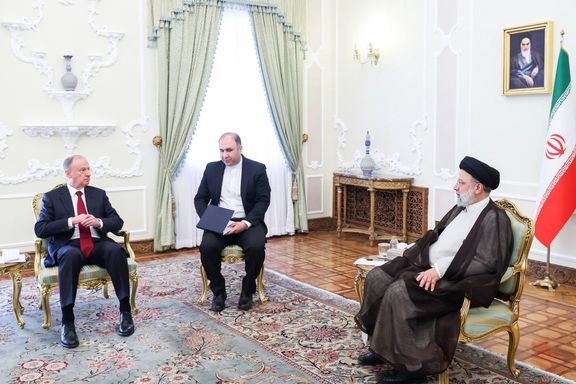
US State Department Thursday voiced concern over expanding ties between Russia and Iran, calling it a “deepening alliance” after Tehran’s drone supplies to Moscow.
Department spokesperson Ned Price answering a question during his press briefing about the visit of Russia’s national security council secretary Nilolai Patrushev to Iran this week, said, “All of this is a concern in the context of the partnership – in some ways the burgeoning partnership – that we’ve seen develop in recent years and in different ways in recent months between Iran and Russia. This is a deepening alliance that the entire world should view as a profound threat.“
Patrushev held meetings with his Iranian counterpart Ali Shamkhani and President Ebrahim Raisi on November 9, discussing their "strategic partnership".
Price referring to Iranian drones used by Russia against Ukraine said that the US is working with the international community "to address the threats that are posed by Russia and Iran separately and the cooperation…between the two of them, including Iran’s dangerous proliferation of weapon systems to Russia."
Price also reiterated concern over Russia possibly helping Iran with knowledge of how to suppress protests but did not share any evidence of such cooperation.
A reporter asked Price during his briefing for more details about an initial statement two weeks ago that Russia may be helping Iran to suppress demonstrators.
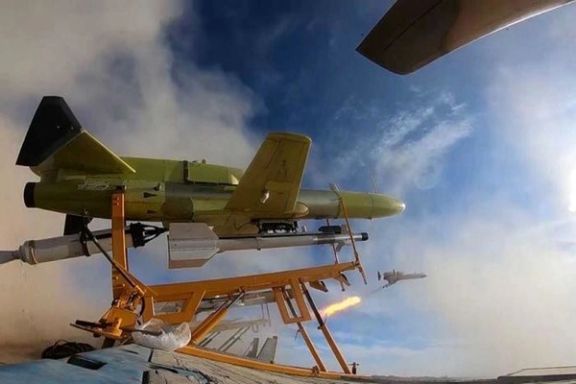
“Unfortunately, there’s nothing more I can provide,’ Price responded adding that “In some instances we’re able to provide additional detail, including as we’ve done with the transfer of weapons. In this case it was the broader point that there are indications that this knowledge may be shared.”
Price went on to say that both Russia and Iran “have a good deal of experience when it comes to repression. They have both demonstrated their effectiveness when it comes to their ability to repress their people…our concern is that they will share this knowledge and that they will attempt to optimize those practices.”
Russia is a signatory of the 2015 nuclear accord known as the JCPOA and played an active role during 18 months of negotiations in Vienna initiated by the Biden Administration immediately after coming to office. But ultimately Iran presented demands unacceptable for Washington and the talks reached a dead-end in August, as Tehran was delivering military drones to Moscow.
In the meantime, Iran continues to expand its nuclear program with enriching more uranium, with having stockpiled 62 kilograms of fissile material enriched at 60 percent, enough for one nuclear weapon. The UN nuclear watchdog, the IAEA confirming this development voiced concern on Thursday [Nov. 10].
Iran is also expanding its missile program, with testing its ballistic missiles with space launches and developing new weapons.
A top Iranian commander announced Thursday that Tehran has developed hypersonic ballistic missile.
"This missile has a high speed and can maneuver in and out of the atmosphere. It will target the enemy's advanced anti-missile systems and is a big generational leap in the field of missiles," commander Amir-Ali Hajizadeh was quoted as saying.
IAEA’s chief Rafael Grossi pointing to this announcement said during the United Nations COP27 climate meeting in Egypt that “We see that all these announcements increase the attention, increase the concerns, increase the public attention to the Iranian nuclear program.”

More and more Iranian actresses are posting photos of themselves without the Islamic Republic’s mandatory hijab as a show of solidarity with antigovernment protests.
Taraneh Alidoosti – best known for Oscar-winning movie "The Salesman" -- posted a picture of herself on Instagram without a headscarf on Wednesday, joining several other actresses who have unveiled in public to express support for the ongoing protests, ignited by the death of 22-year-old Mahsa Amini in custody of hijab or ‘morality’ police.
In her photo, the artist hold up a sign which reads, "Woman, Life, Freedom" in Kurdish, the main motto of the protest rallies that have been echoing across Iran and abroad for the past 53 days. Along with her Instagram photo, Alidoosti, who has published many Instagram posts critical of the clerical regime in the past, also wrote phrases of a song by contemporary singer-songwriter Shahyar Ghanbari. "Your final absence, the migration of singing birds, is not the end of this rebellion," read the poem, signaling her support for the protests.
Describing the move as “an cultural earthquake,” anti-hijab activist Masih Alinejad posted Alidoosti’s photo on her twitter account. “Another blow lands against gender apartheid regime,” she said.
Earlier on Thursday, two other Iranian actresses – namely Donya Madani and Khazar Ma'soomi – also posted photos of themselves without hijab.
In her post without hijab, Donya Madani said, "Now, I am myself and what I see in the mirror is myself. I will fight for women, life, freedom." Khazar Ma'soomi also shared a poem about Iran.
Three other female filmmakers -- Azadeh Bizargiti, Mina Akbari, and Maryam Yavari – also published photos without hijab on Thursday.

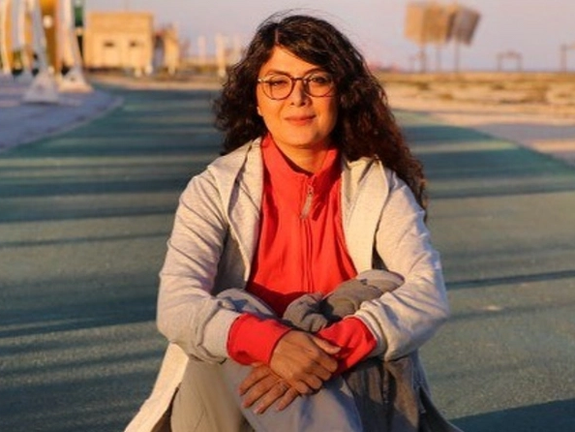
Many Iranian celebrities in Iran and abroad praised the move by the actresses and shared their photos on their social media pages to express their support.
Since the start of protests, several other female actresses have posted pictures of themselves without the compulsory hijab in solidarity with the demonstrations. Among the first ones was Katayoun Riyahi, who has not been heard of since reports about her attempted arrest by security forces.
Such acts of defiance by actresses have been a thorn in the eyes of the Islamic Republic’s state broadcaster that has to remove them from TV sitcoms and movies they had appeared in or stop airing the shows altogether.
In addition to actresses, several Iran-based athletes have unveiled in public or posted on social media in support of the protests.
Parmida Ghasemi is the latest athlete who removed hijab in public. Unlike other athletes who defied the hijab rules when competing abroad, she removed her head covering on the podium at the end of an archery cup.
Last week, Niloufar Mardani, a member of the national Iranian speed skating team stepped on a podium in Turkey on November 6 to receive the top award while not wearing a headscarf.
She was arrested by the Islamic Republic’s agents after returning to Iran and later a statement attributed to her was published in which she said she appeared unveiled in public by mistake. Most Iranians believe that such statements are made under the pressure of regime agents.
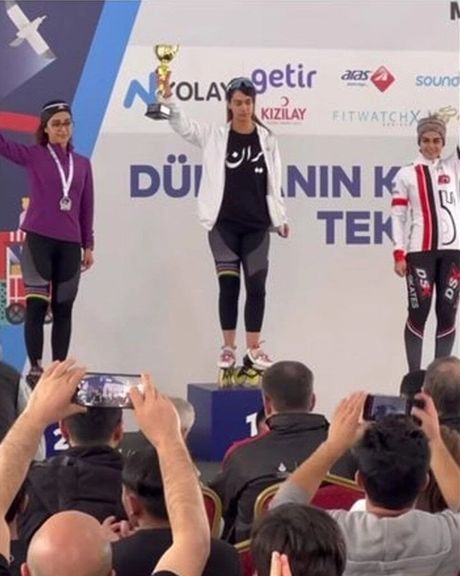
In October, Iranian climber Elnaz Rekabi appeared without hijab in the finals of competitions in South Korea, causing an international sensation. She was greeted by a huge welcoming crowd as she returned home but the vehicle carrying her did not stop and passed through the large crowd, taking her directly to a meeting of the country’s sports minister.
Shortly after, state media published a video interview of Rekabi in the airport arrival hall, in which the athlete called her move to appear without hijab “inadvertent.”
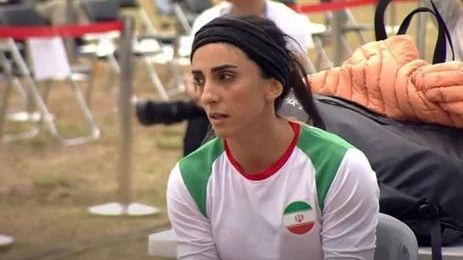
Iran’s national beach football team did not cheer or celebrate after winning the cup following their final victory against Brazil and also refused to sing the national anthem of the Islamic Republic at the beginning of their semifinal match against the UAE.
During the final, Iranian striker Saeed Piramoun expressed his solidarity with Iranian protesters by miming the hair cutting gesture after scoring a goal, a move that has drawn enormous appreciation by Iranian social media users and renowned footballers alike.
The “hair-cutting” gesture has become an international symbol of solidarity with Iranian women and the protest movement with many international athletes and celebrities posting images of themselves re-enacting the move.
Mohammad Hosseini made the remarks during a Thursday interview with Al Mayadeen TV, a media outlet close to Iran-backed Lebanese militant organization Hezbollah.
"We'll respond wherever necessary, even in other countries, as we did in the case of Iraqi Kurdistan. We may even take some actions and not announce them," he said.
The intelligence services of the US, the UK, France, Israel and Saudi Arabia are conspiring against the Islamic Republic round the clock, he claimed, adding that “even some European embassies” tried to provoke people during the recent protests and were consequently warned.
Referring to the ongoing protest and strikes across the country and its coverage by Iran International and other foreign-based Persian-language media, he said, “We now consider Iran International as a terrorist network. Many of its elements inside the country have been arrested.”
He added that “Iran International, Manoto, BBC, etc. have started a media tsunami against the Islamic Republic and its people,” claiming that “They based their work on the big lie of killing Mahsa Amini [by hijab police], someone who had been sick since childhood.”
On Thursday, Iranian intelligence arrested Elham Afkari, claiming that she was “an agent” of Iran International. Afkari is the sister of Iranian wrestler Navid Afkari who was executed in September 2020, after participating in protests. Earlier in the week, two of our to their lives by the UK Police.